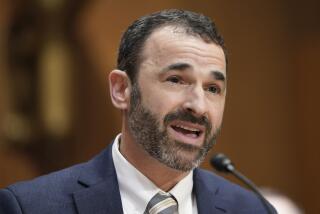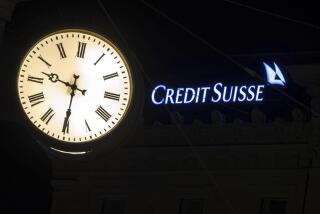UBS to divulge 4,000 account names, more expected
Time is running out for wealthy Americans with secret Swiss bank accounts as they weigh whether to hand themselves in to the Internal Revenue Service or gamble that their names are not among the thousands set to be exposed in one of the U.S. government’s most aggressive efforts to hunt down international tax cheats.
The Swiss government will turn over names of suspected U.S. tax dodgers who have held 4,450 secret accounts at banking giant UBS -- accounts that at one point together contained as much as $18 billion, U.S. officials said Wednesday. Furthermore, the Swiss government promised to assist Washington in similar investigations at other Swiss banks, the IRS said.
The announcement follows a long-running U.S. effort to penetrate Swiss bank secrecy, focusing first on UBS. The federal government had been seeking a U.S. court order demanding that UBS identify the holders of 52,000 accounts. The Swiss government had promised to block such a disclosure, leading to weeks of negotiations followed by Wednesday’s announcement of a settlement.
“We will be receiving an unprecedented amount of information,” IRS Commissioner Douglas Shulman said. “This agreement represents a major step forward with the IRS’ efforts to pierce the veil of bank secrecy and combat offshore tax evasion.”
The U.S.-Swiss deal is a blow to rich Americans who have enjoyed Switzerland’s legendary banking secrecy. Some UBS customers have taken advantage of a leniency program that allows them to come forward to the IRS in exchange for reduced penalties. That program, which began in March, expires Sept. 23.
But others may want to take the chance that their accounts won’t be uncovered.
It isn’t clear how the names will be chosen.
“You really have to think about whether you want to stick your head out and do this, or make the calculated judgment that your name is not going to be disclosed,” said Robert W. Ray, a white-collar criminal defense lawyer at Pryor Cashman. He said some of his clients had taken advantage of the leniency program, but others were waiting on the sidelines to see what they should do.
IRS officials offered no estimate of how much the agency might recoup in back taxes and penalties.
Shulman said the deal sent an “unmistakable message” to tax dodgers: “Wealthy Americans who have hidden their money offshore will find themselves in a jam,” he said.
But Sen. Carl Levin (D-Mich.), who held hearings on UBS last year, called the U.S.-Swiss deal “at most a modest advance” toward ending abuses of bank secrecy.
The Swiss government has agreed to work with the U.S. on similar requests for disclosure involving other Swiss banks, Shulman said on a conference call with reporters.
UBS Chairman Kaspar Villiger said in a statement that the settlement “helps resolve one of UBS’s most pressing issues.”
UBS will pay no penalties under the deal, the bank said.
In February, to avoid criminal prosecution, UBS agreed to pay the U.S. government $780 million and admitted that it had schemed to defraud the U.S. by helping Americans hide money from the IRS. At that time, the Swiss provided the names of 200 to 300 American depositors, and UBS said Swiss law prohibited it from disclosing any more.
Switzerland was fighting to preserve the reputation for privacy that has made its banking industry a global powerhouse and a pillar of the Swiss economy.
The settlement announced Wednesday includes potentially face-saving concessions for Switzerland, as it argues that its tradition of secrecy survived the battle. The U.S. agreed to narrow its request for names to those considered most likely to have engaged in tax evasion.
Swiss law already allowed the release of client information under certain egregious circumstances, such as fraud. But the threshold for disclosing the information has been a point of contention.
More to Read
Inside the business of entertainment
The Wide Shot brings you news, analysis and insights on everything from streaming wars to production — and what it all means for the future.
You may occasionally receive promotional content from the Los Angeles Times.










